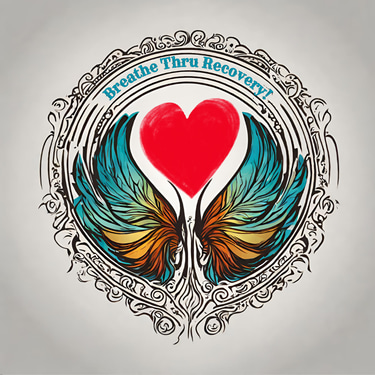Breathwork in Addiction Recovery
Discover how the power of breathwork can transform addiction recovery. Learn about the benefits, techniques, and practical steps to incorporate conscious breathing into your healing journey. Explore popular methods like Diaphragmatic Breathing, Box Breathing, and the 6-8-10 Pythagorean Square Breathing developed by Albert Martinez. Unlock the potential of your breath to reduce stress, enhance emotional regulation, and support overall well-being.
Albert Martinez
6/11/20244 min read
Introduction to Breathwork
In the journey of addiction recovery, finding effective tools to manage stress, enhance emotional regulation, and support overall well-being is crucial. One such powerful tool is breathwork. This practice of conscious breathing offers a myriad of benefits that can transform the recovery experience.
What is Breathwork?
Breathwork involves various techniques that focus on controlling the breath to influence the body’s physiological and psychological states. By harnessing the breath, individuals can tap into a natural and effective way to calm the mind, reduce stress, and promote healing. These techniques range from simple deep breathing exercises to more structured practices like Pranayama, Holotropic Breathwork, and Box Breathing.
For more on the various breathwork techniques, visit our Breathwork Potential page. ...
Benefits of Breathwork in Addiction Recovery
Addiction recovery is a multifaceted process that requires a holistic approach to address both physical and mental health. Breathwork can play a significant role in this journey by offering several key benefits:
1. Stress Reduction: Conscious breathing activates the parasympathetic nervous system, which helps to reduce stress and anxiety. This is particularly beneficial for individuals in recovery, as stress is often a trigger for substance use.
2. Emotional Regulation: Breathwork aids in emotional regulation by promoting mindfulness and helping individuals to stay grounded. This can lead to better emotional control and reduced impulsivity.
3. Enhanced Mental Clarity: Regular breathwork practice can improve focus and mental clarity, making it easier to navigate the complexities of recovery and make healthier choices.
4. Physical Health Benefits: Breathwork can improve lung capacity, circulation, and overall physical health, which are essential for those recovering from addiction.
Popular Breathwork Techniques
1. Diaphragmatic Breathing
This basic technique involves deep breathing into the diaphragm. It’s excellent for beginners and promotes relaxation.
2. Box Breathing
A structured method involving equal counts of inhaling, holding, exhaling, and holding. It enhances focus and reduces stress.
3. 6-8-10 Pythagorean Square Breathing
Developed by Albert Martinez, this technique involves inhaling for six counts, holding for eight, and exhaling for ten. It balances the mind and body through a structured breathing pattern.
For a deeper dive into these techniques and their benefits, visit our Breathwork Potential page.
Incorporating Breathwork into Recovery Programs
To maximize the benefits of breathwork, it is important to incorporate it into a comprehensive recovery program. This can be achieved through individual practice, group sessions, or as part of a larger therapeutic framework. Working with a trained breathwork practitioner can provide personalized guidance and ensure that techniques are performed correctly.
Additionally, integrating breathwork with other recovery strategies, such as counseling, support groups, and physical exercise, can create a well-rounded approach that addresses all aspects of recovery.
Discover how breathwork can support your recovery journey and enhance overall well-being. Learn more about Breathwork Potential on our dedicated page.
Breathwork as a Tool for Goal Achievement:
Beyond its role in stress reduction and emotional regulation, breathwork can also serve as a powerful ally in achieving personal goals. By practicing intentional breathing techniques, you can enhance your focus, boost motivation, and develop the mental clarity needed to define and pursue your objectives.
One effective method is to incorporate breathwork into your daily routine, using it as a foundation for goal-setting and planning. Start each day with a short breathwork session, followed by a review of your goals and the steps needed to achieve them. This practice fosters a sense of purpose and intention, empowering you to take consistent action towards your desired outcomes.
Moreover, breathwork can help you overcome obstacles and setbacks that may arise along your path to success. When faced with challenges, pause and reconnect with your breath, allowing yourself to regain composure and perspective. By cultivating resilience and adaptability through breathwork, you'll be better equipped to navigate the ups and downs of your journey and stay committed to your goals.
Breathwork for Enhancing Physical Well-being:
The benefits of breathwork extend beyond the realm of mental and emotional health, positively impacting your physical well-being as well. Regular breathwork practice can improve circulation, boost energy levels, and support the body's natural detoxification processes.
To optimize these physical benefits, experiment with various breathing techniques and observe their effects on your body. You may find that certain methods, such as alternate nostril breathing or diaphragmatic breathing, resonate more strongly with your unique constitution.
Incorporating breathwork into your daily self-care routine, alongside healthy eating, exercise, and proper sleep, can contribute to a well-rounded approach to physical wellness. As you nourish your body through conscious breathing, you'll lay the groundwork for long-term health and vitality.
Breathwork for Strengthening Relationships:
Finally, breathwork offers a unique avenue for fostering stronger, more authentic connections with others. By engaging in breathwork practices with friends, family, or a partner, you can cultivate empathy, understanding, and mutual support within your relationships.
Consider attending a group breathwork workshop or sharing your favorite techniques with loved ones. As you explore the power of breath together, you'll deepen your bonds and create a shared foundation for personal growth and emotional well-being.
As you continue to explore the many facets of breathwork, remember that there is no "one-size-fits-all" approach. Embrace the journey of self-discovery and experimentation, tailoring your practice to align with your unique goals, needs, and preferences. With dedication and an open mind, you'll unlock the limitless potential of breathwork as a catalyst for transformation in all areas of your life.
Conclusion
Breathwork is a powerful tool that can significantly enhance the addiction recovery process. By reducing stress, improving emotional regulation, and supporting overall well-being, breathwork offers a holistic and effective way to support individuals on their path to recovery. As more people become aware of its benefits, breathwork is likely to become an increasingly integral part of addiction recovery programs.


